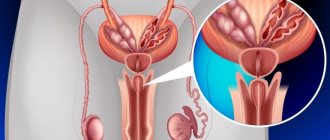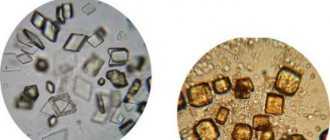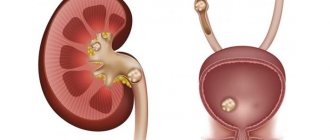Which doctor should I contact?
A person who first encounters symptoms indicating kidney problems consults a general practitioner (for children, a pediatrician) at his place of residence.
The alternative, in this case, is a general practitioner (family doctor). Reasons for visiting a therapist are:
- systematic lumbar pain;
- disturbance of the process of urination and the appearance of urine;
- persistently elevated blood pressure;
- hyperthermia;
- regular vomiting.
Based on the totality of symptoms, the doctor may suspect problems with the kidneys. At the initial appointment, the patient is examined and a medical history is taken. The patient is prescribed blood and urine tests (tests) and is given a referral for ultrasound (ultrasound).
Based on the results of hardware procedures and the presence of normative deviations in the tests, the doctor differentiates the disease and makes a decision: to engage in therapy independently or to refer the patient to a colleague who specializes in renal pathologies.
Diagnosis, treatment and prevention of diseases of the urinary system are carried out by two doctors - a nephrologist and a urologist. These specializations are related, but have a number of fundamental differences.
A healthy diet for kidney disease is the basis for successful treatment. When the disease is diagnosed and appropriate medication therapy is prescribed, it is not a bad idea to visit a nutritionist.
His advice will help reduce symptoms and reduce the risk of complications and exacerbations. The doctor will help:
- identify prohibited and permitted products;
- adjust diet and eating behavior;
- create the right menu of healthy and tasty dishes;
- optimize your drinking regime.
The nutritionist will calculate the number of calories and the balance of nutrients (fats, carbohydrates, proteins), according to the individual characteristics of the patient and his specific disease.
A urologist is a doctor who treats kidneys and pathologies of the urinary organs. To check the male genitourinary system, you also need to consult a urologist. Indications for visiting a doctor:
- inflammation of the prostate gland;
- violation of male reproductive function;
- gynecological infections;
- neoplasms in the bladder;
- “bags” under the eyes;
- anaphrodisia;
- pain in the lower back, buttocks, lower abdomen;
- sharp pain and burning sensation when emptying the bladder;
- all manifestations with which you can contact a nephrologist.
Diseases treated by a urologist:
- cystitis;
- varicocele;
- adenoma;
- prostatitis;
- impotence;
- urethritis;
- epididymitis;
- urolithiasis;
- hydrocele;
- condylomatosis;
- age-related decrease in the production of male hormones.
The specialist deals with problems related to urination, in addition, many urologists are qualified practicing surgeons. If abnormal changes occur in the urinary organs that require surgery, you should not delay consulting a doctor.
Competence of a urologist
Which doctor should you go to if you feel severe pain in the lower abdomen, in the genital area, difficulty urinating, pain and pain in the lower back? All these symptoms relate to diseases that a urologist treats.
This doctor can also be classified as a surgical specialist. It can treat not only kidneys, but also diseases of the genitourinary system in men. What is the difference between a urologist and a nephrologist?
- the presence of inflammatory processes in the kidneys - qualification of a nephrologist;
- pathology of the bladder, urinary tract and male problems is the competence of a urologist.
In addition to consultation and diagnosis of an existing disease, a urologist-surgeon performs surgical interventions to crush stones, open operations on the kidneys and organs of the genitourinary system.
If your kidneys hurt, then turning to a urologist for help would be right. This doctor treats the organ at the initial and middle stages of the disease, and also eliminates:
- all clinical cases handled by the nephrologist;
- pathologies of the genitourinary system;
- decreased sexual activity;
- gynecological infections in women;
- neoplasm in the bladder;
- pain in the abdomen, lower back or buttocks;
- difficulty or painful urination;
- puffiness under the eyes;
- prostatitis and male infertility.
Cases of contacting such a doctor also include lack of sexual desire, infertility, pain and pain when emptying the bladder.
Help from a nutritionist
The first step is to go to your local physician. This is a specialist with knowledge in many areas of medicine, including nephrology. The therapist checks the general condition of the body, prescribes a general blood and urine test. The local doctor will tell you the name of the kidney doctor and direct you to the right office.
The therapist can prescribe a course of treatment if the patient is diagnosed with pyelonephritis (most often the disease is detected in the female part of the population). Antibiotics, painkillers and anti-inflammatory drugs will help eliminate inflammation of the calyces, parenchyma and renal pelvis.
DETAILS: Cystitis with blood in women treatment
The local doctor is able to provide assistance when the patient is suffering from symptoms of urolithiasis. However, if surgical intervention is required, for example, crushing stones, the therapist is powerless.
It is recommended to visit your local doctor’s office in the following cases:
- During urine excretion, pain and burning are observed;
- The lower back is pulling and aching. In this case, the pain may radiate to the side;
- bloody clots or mucus appear in the urine;
- the consistency of the discharge has become cloudy and its color has changed.
If pain in the kidney area torments a child, you should consult a pediatrician. If a child complains of low back pain, parents should always consult a doctor
When your kidneys hurt, you shouldn’t neglect treatment. Above the upper renal poles are special glands - the adrenal glands. This is a source of hormones that regulate the most important metabolic processes (adrenaline, norepinephrine, corticosteroids).
In addition, paired glands close to the kidneys are responsible for the body’s adaptation to stressful conditions. The adrenal glands are associated with the most serious disorders of the body: hypercortisolism and Conn's syndromes, Addison's disease, etc.
If your kidneys hurt, you need to adjust your daily menu. A doctor specializing in proper nutrition, a nutritionist, will help you do this. The doctor looks at the patient’s medical history and recommends a diet that, together with complex treatment, will help eliminate the existing pathology.
For example, if the cause of acute pain lies in oxalate kidney formations, it is advisable to choose a diet with a low content of ascorbic acid in foods. Such measures will speed up the process of removing stones and alleviate the patient’s condition.
The kidneys play a huge role in the functioning of all human systems. Medicine knows many diseases that arise due to disorders of the kidneys. If pain occurs, you should immediately visit a medical specialist. But who should you turn to if your kidneys hurt?
It is known that therapists are general doctors, so when various symptoms arise, most patients turn to him. The doctor has the right to carry out treatment related to renal pathologies and inflammatory processes in this area. It helps eliminate the signs of kidney stones.
When pyelonephritis or glomerulonephritis occurs, symptomatic treatment is carried out with antibacterial drugs. It is in this case that the help of a therapist is needed. If the disease is severe, you should consult a nephrologist. An alternative option is to immediately contact a nephrologist.
If you are sure that the pain syndrome is associated with the kidneys and not with other organs, you do not need to consult a therapist.
If a disease such as urolithiasis occurs, a surgeon can help. In this case, the attending doctor prescribes a course aimed at eliminating the blockage in the urinary tract by stones.
When such symptoms appear, the therapist is able to detect the disease, determine its type and prescribe therapy. In case of stones, the doctor is obliged to provide consultations, and then refer the patient to a doctor of another profile, since it is necessary to crush small formations.
If a child experiences pain in the kidneys, it is necessary to contact a pediatrician who will conduct an examination and then prescribe an appropriate course.
The specialist who prescribes appropriate nutrition during the progression or after the end of the disease is called a dietitian. Of course, the attending physician can help in this matter, but a nutritionist will provide more qualified assistance.
DETAILS: Kidney cyst: symptoms, causes, treatment
The main goal of the course of treatment with this specialist is to reduce the level of toxins and purines in the blood. The course is also aimed at normalizing the acid-base balance in the urine and eliminating the consequences of renal failure.
If the patient is worried about discomfort in the sides and lower back, it is better to seek advice from a general specialist. If you have problems with urination, a urologist can help. Problems with renal colic can be resolved by a urologist and nephrologist.
Pediatrician and therapist
Which doctor treats kidneys in women and men? Therapists are general specialists. These doctors perform primary diagnostics and treat somatic pathology – diseases of the internal organs.
Thus, your local attending physician can conduct a comprehensive examination and prescribe a treatment plan for the most common diseases of the urinary system - pyelonephritis, glomerulonephritis, urolithiasis, chronic renal failure (if a specialist in kidney pathologies excludes acute complications and obstruction).
Pyelonephritis is a common acute or chronic inflammation of the collecting apparatus in the kidney. It is more often unilateral and occurs in all age groups. Due to the peculiarities of the anatomical structure, women get sick 1.5-2 times more often than men.
Glomerulonephritis is an infectious-allergic disease with predominantly renal symptoms. What parts of the urinary system are affected by glomerulonephritis? First of all, these are the glomeruli, or the functional apparatus of the kidneys.
The acute form of the pathology often proceeds violently, with pronounced clinical manifestations, and therefore may require observation by specialist doctors (nephrologist, immunologist) or even hospitalization in a hospital.
Patients with chronic glomerulonephritis are usually seen by a physician on an outpatient basis.
Urolithiasis (in the medical literature it can also be called nephrolithiasis) is another pathology under the “management” of a general practitioner. However, in some cases, the patient should also be examined by a nephrologist and urologist.
If you are in doubt about which doctor to contact if you have kidney stones, always choose a therapist: even if he does not cure the problem, he will draw up a competent plan for further action.
Many patients who go to their local physician are patients with chronic renal failure. Chronic renal failure is a disease accompanied by a gradual irreversible loss of the functional activity of the urinary organs.
Thus, if you go to a therapist, it means that you have a chronic pathology without serious complications. A general specialist will be able to draw up an individual follow-up plan for you, check the anatomical and physiological characteristics of the urinary organs using a clinical examination, laboratory tests and ultrasound of the kidneys, and treat common diseases (for example, pyelonephritis, urolithiasis).
If there are indications, it is he who decides on the need for consultation or inpatient care of the patient.
Primary relief of inflammatory processes is carried out by a therapist in adults, and by a pediatrician in children. These same specialists evaluate the results of urine and blood tests and, if necessary, give a referral to a urologist.
The therapist can prescribe a course of treatment if the patient is diagnosed with pyelonephritis (most often the disease is detected in the female part of the population). Antibiotics, painkillers and anti-inflammatory drugs will help eliminate inflammation of the calyces, parenchyma and renal pelvis.
If the symptoms indicate damage to the glomeruli and tubules of the interstitial renal tissue - glomerulonephritis, adequate treatment is required, selected by a nephrologist.
Differences between a nephrologist and a urologist
The main differences between medical specializations are:
- scope of activity of doctors;
- treatment methods used.
A nephrologist deals with the therapeutic treatment of the urinary system, with an emphasis on kidney disease.
In nephrology, medicinal, phytotherapeutic, and physiotherapeutic treatment methods are used. Surgical intervention in nephrology is not provided.
A urologist has a broader field of activity, since in addition to diseases of the kidneys and other urinary organs, he treats problems of male sexual and reproductive health.
The treatment methods used include not only conservative therapy, but also the elimination of pathologies through surgical operations.
Which doctor is needed for kidney pain: which specialist treats the kidneys
A nephrologist is a doctor who treats the kidneys. This is a highly specialized specialist who does not perform surgical treatment of the organ, but prescribes outpatient therapy. The doctor's competencies include:
- diagnosis of the disease at an early stage;
- selection of a therapeutic course;
- adjustment of treatment prescribed by another specialist (if necessary);
- dietary recommendations.
You should not postpone visiting a nephrologist if:
- the process of urination is painful;
- increased urge to go to the toilet;
- Urine incontinence occurs regularly (both during the day and at night);
- Puffiness of the face and swelling of the legs are observed.
A nephrologist checks the kidneys of women and men, but does not diagnose and eliminate genitourinary diseases
Signs of kidney problems in women
- acute pyelonephritis is a serious disease characterized by an acute inflammatory process in a paired organ;
- glomerulonephritis - a pathology that affects the glomeruli, tubules and interstitial tissue of the kidneys;
- lupus nephritis is an autoimmune disease that occurs in patients with systemic lupus erythematosus;
- urate nephropathy - damage to the organ by uric acid crystals;
- neoplasms;
- renal colic;
- hypertension associated with kidney disease;
- drug nephropathy - structural changes in the organ that occur while taking certain drugs.
A nephrologist can help solve your child's urinary problems.
Parents should be wary if their children's urine has acquired an unnatural color or its quantity has changed significantly. A characteristic sign of the pathology is pain that occurs when the child goes to the toilet (most often the symptom is observed in boys). When such manifestations occur, consultation with a nephrologist is a necessity.
We have clarified the conditions under which a kidney specialist is needed. What is the name of the specialist who deals with liver problems and in what cases should you contact him? Let's take a closer look.
The liver belongs to the organs of the digestive system. This is an organ that simultaneously performs a huge number of functions:
- Inactivation of toxic substances, poisonous elements that have entered the body;
- Participation in metabolic processes with acceleration of the output of their final results.
- Active participation in gluconeogenesis.
- Production, storage and secretion of bile to participate in digestive processes.
- Accumulation of vitamins and microelements.
- Storage of large quantities of blood elements.
Painful conditions of this organ are also dealt with by two specialists - a gastroenterologist and a hepatologist. A gastroenterologist considers the liver directly as an element of the digestive system.
A hepatologist has a broader profile in liver disease. You need to seek help for the treatment of the following diseases:
- toxic and viral hepatitis;
- hepatomegaly or hepatosis;
- liver damage due to tuberculosis or syphilis;
- liver abscess formation;
- traumatic and tumor lesions;
- hepatic vein thrombosis;
- infections or parasite infestations;
- hereditary abnormalities and autoimmune diseases.
DETAILS: Herbs for the female genitourinary system
A highly specialized specialist will solve kidney problems
What is the name of the medical professional you should contact and whose job is to treat kidney ailments? This is a nephrologist whose knowledge and treatment are in-depth and focused on diseases of the paired organ.
This specialist will conduct an examination, based on the test results, prescribe treatment and an individual diet, which is best followed until recovery, as well as for preventive purposes, to avoid the disease becoming chronic.
If pathologies are detected, the nephrologist will tell the patient about further actions, and will also write a referral to a urologist, who will treat the organ using surgical methods.
Medical statistics show that 65 million earthlings, most of whom are girls and women, annually develop an inflammatory process in the pelvic organs, which is called pyelonephritis. Infection occurs due to bacteria that enter the internal organs of a person in different ways and affect one or both kidneys. Sometimes inflammation spreads from the genitourinary tubes, moving from cystitis or urethritis to the chronic or acute form of pyelonephritis.
Patients may have a question about which doctor treats pyelonephritis: a general practitioner or a nephrologist. You can contact anyone. Both will prescribe antibacterial and symptomatic medications that will help destroy the stones formed due to the unhealthy process. But it would be more correct to consult a nephrologist who has more in-depth knowledge of renal disorders.
It is important to remember that if treated incorrectly, pyelonephritis develops into complications, causing chronic or acute renal failure, as well as some dangerous pathologies.
Screening Frequency and Outcomes
Kidney health needs to be monitored on a regular basis. The frequency of examinations depends on the symptoms experienced, whether the patient belongs to a risk group, and the presence of chronic renal pathologies.
The risk group includes people with a history (their own or that of relatives) of chronic kidney disease.
Some diseases are transmitted genetically; the best option is to identify them at the initial stage of development.
For patients who are registered with a nephrologist or urologist, or people with congenital kidney anomalies, examination is recommended at least once a year. If necessary, the doctor can increase the number of procedures.
If you have symptoms of kidney disease, you must visit a doctor, undergo an ultrasound examination, and take blood and urine microscopy tests. If the kidneys do not cause concern, you should not neglect examination once every three years as part of a medical examination (according to the age category).
Using modern diagnostic methods, it is not difficult to identify kidney disease and determine which category it belongs to. Only a specialist in this industry can prescribe the only correct treatment tactics. For any renal pathology, consultation with a nephrologist or urologist is necessary.
Symptoms for which you should consult a doctor
You need to know for which symptoms home treatment with heat and baths is not enough:
- if you have a burning sensation when passing urine,
- if you experience pain during urination,
- if there is atypical discharge in the urine that looks like mucus, turbidity or blood,
- if the urine color is not natural,
- if the discomfort in the lumbar region is aching, localized from the sides to the center and back.
The doctor may prescribe painkillers before starting treatment if there are no contraindications. In this case, an ultrasound examination of the kidneys, abdominal cavity, and MRI are required, of course, with tests. Therapy is carried out based on diagnostic results.
It is possible to involve a third specialist in the diagnosis to make an accurate diagnosis if standard methods are not enough. Many patients with chronic ailments already know their circle of necessary specialists and go straight to them on their own.
Useful information for the patient
Before making a final diagnosis, the doctor will prescribe the necessary tests and ultrasound of the kidneys. After contacting a nephrologist or urologist, the patient does:
- ultrasonography of the bladder;
- urine culture;
- blood chemistry;
- computer and magnetic resonance imaging of the diseased organ;
- undergoes a fundus examination;
- fluoroscopic examination.
The cause of acute pain is often kidney stones. Once in the ureter, a kidney stone can cause unbearable pain. Blood is often found in the patient's urine. Consultation with a urologist in such a situation will be indispensable.











